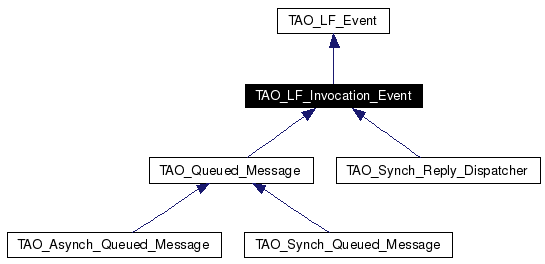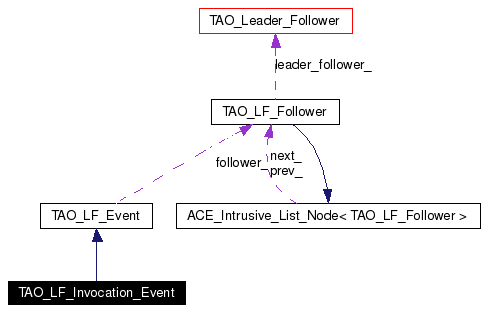
#include <LF_Invocation_Event.h>
Inheritance diagram for TAO_LF_Invocation_Event:


Public Member Functions | |
| TAO_LF_Invocation_Event (void) | |
| Constructor. | |
| virtual | ~TAO_LF_Invocation_Event (void) |
| Destructor. | |
| int | successful (void) const |
| int | error_detected (void) const |
Protected Member Functions | |
| virtual void | state_changed_i (int new_state) |
| Validate and perform the state change. | |
Private Member Functions | |
| int | is_state_final (void) |
| Check whether we have reached the final state.. | |
Concrete event types and manipulation class through which the invocation data path would flow. Typically state changes of interest include whether a message has arrived, or timedout waiting for a message or if the cionnection is closed waiting for a message. Details of the states are documented within the class.
Definition at line 39 of file LF_Invocation_Event.h.
|
|
Constructor.
|
|
|
Destructor.
Definition at line 15 of file LF_Invocation_Event.cpp.
00016 {
00017 }
|
|
|
Return 1 if an error was detected while waiting for the event Implements TAO_LF_Event. Definition at line 75 of file LF_Invocation_Event.cpp. Referenced by TAO_Wait_On_Read::wait(), and TAO_Wait_On_Reactor::wait().
00076 {
00077 return (this->state_ == TAO_LF_Event::LFS_FAILURE
00078 || this->state_ == TAO_LF_Event::LFS_TIMEOUT
00079 || this->state_ == TAO_LF_Event::LFS_CONNECTION_CLOSED);
00080 }
|
|
|
Check whether we have reached the final state..
Implements TAO_LF_Event. Definition at line 83 of file LF_Invocation_Event.cpp.
00084 {
00085 if (this->state_ == TAO_LF_Event::LFS_TIMEOUT ||
00086 this->state_ == TAO_LF_Event::LFS_FAILURE)
00087 return 1;
00088
00089 return 0;
00090 }
|
|
|
Validate and perform the state change.
Implements TAO_LF_Event. Definition at line 20 of file LF_Invocation_Event.cpp. Referenced by TAO_Synch_Queued_Message::bytes_transferred(), TAO_Asynch_Queued_Message::bytes_transferred(), and TAO_Synch_Reply_Dispatcher::TAO_Synch_Reply_Dispatcher().
00021 {
00022 if (this->state_ == new_state)
00023 return;
00024
00025 // Validate the state change
00026 if (this->state_ == TAO_LF_Event::LFS_IDLE)
00027 {
00028 // From the LFS_IDLE state we can only become active.
00029 if (new_state == TAO_LF_Event::LFS_ACTIVE
00030 || new_state == TAO_LF_Event::LFS_CONNECTION_CLOSED)
00031 this->state_ = new_state;
00032 return;
00033 }
00034 else if (this->state_ == TAO_LF_Event::LFS_ACTIVE)
00035 {
00036 // From LFS_ACTIVE we can only move to a few states
00037 if (new_state != TAO_LF_Event::LFS_IDLE)
00038 {
00039 if (new_state == TAO_LF_Event::LFS_CONNECTION_CLOSED)
00040 {
00041 this->state_ = TAO_LF_Event::LFS_FAILURE;
00042 }
00043 else
00044 {
00045 this->state_ = new_state;
00046 }
00047 }
00048 return;
00049 }
00050 else if (this->state_ == TAO_LF_Event::LFS_SUCCESS
00051 || this->state_ == TAO_LF_Event::LFS_CONNECTION_CLOSED)
00052 {
00053 // From the two states above we can go back to ACTIVE, as when a
00054 // request is restarted.
00055 if (new_state == TAO_LF_Event::LFS_ACTIVE)
00056 {
00057 this->state_ = new_state;
00058 }
00059 return;
00060 }
00061 else/* if (this->state_ == TAO_LF_Event::LFS_TIMEOUT || FAILURE */
00062 {
00063 // Other states are final..
00064 }
00065
00066 }
|
|
|
Return 1 if the condition was satisfied successfully, 0 if it has not Implements TAO_LF_Event. Definition at line 69 of file LF_Invocation_Event.cpp. Referenced by TAO_Wait_On_Read::wait(), and TAO_Wait_On_Reactor::wait().
00070 {
00071 return this->state_ == TAO_LF_Event::LFS_SUCCESS;
00072 }
|
 1.3.6
1.3.6